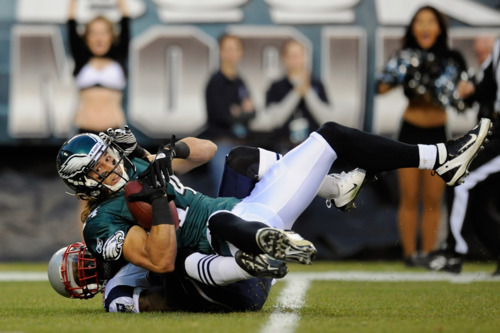
Friend of the blog Justin F. wrote a post at Bleeding Green Nation in which he calculated the Eagles’ Pythagorean win percentage, a metric that estimates a team’s wins based simply on points scored and allowed. Justin notes that the Eagles jump up to just over .500 if you calculate win percentage using the Pythagorean method (compared to .385 in real life). Then he offers a common explanantion:
So why is there a such a discrepancy between the Eagles’ actual win percentage and Pythagenport win percentage?
A very good question, and the answer probably is not what people want to hear and/or believe, although it is true. In one word: luck. In two words: bad luck.
What follows in the comments at BGN is a discussion that unfortunately devolves into rambling incoherency, where the luck explanation is aligned with a belief in stats and doubters read like WIP callers. But the truth is more nuanced.
Explaning the difference between actual and Pythagorean win percentage as “bad luck” is overly simplistic. That is one possible explanation, but should not be used as an all-encompassing default. Rather, we must examine whether bad luck is actually the cause.
There are certain well-known measures for luck in the NFL. For example, fumble recovery, field goal percentage, schedule strength, and injuries. However, the Eagles haven’t had a problem with any of those.
The Eagles have recovered 48 percent of fumbles, just barely below average. They’re 10th-best in field goal percentage, with Alex Henery hitting 86 percent. Meanwhile, Eagles opponents are actually worst in the NFL, making only 65 percent of their attempts. The Eagles have faced the 18th-hardest DVOA schedule, and the three games Michael Vick lost to injury were average. No evidence of bad luck here.
However, there are plenty of other non-luck outlying factors that could account for the actual-Pythagorean discrepancy. Factors like:
- 30th in the NFL in opponent red zone TD percentage.
- 26th in fourth quarter points allowed.
- 32nd in interception percentage.
- 25th in first down-inducing penalties.
- 19th in DVOA variance.
- 27th in missed tackles (as of week nine).
If you’re going to call the 2011 Eagles underachieving — a label I’m not adverse to using — don’t blame it on the easy out. Luck is always involved, but it shouldn’t be an automatic determination. The above factors are much more likely to be the cause.
Photo from Getty.